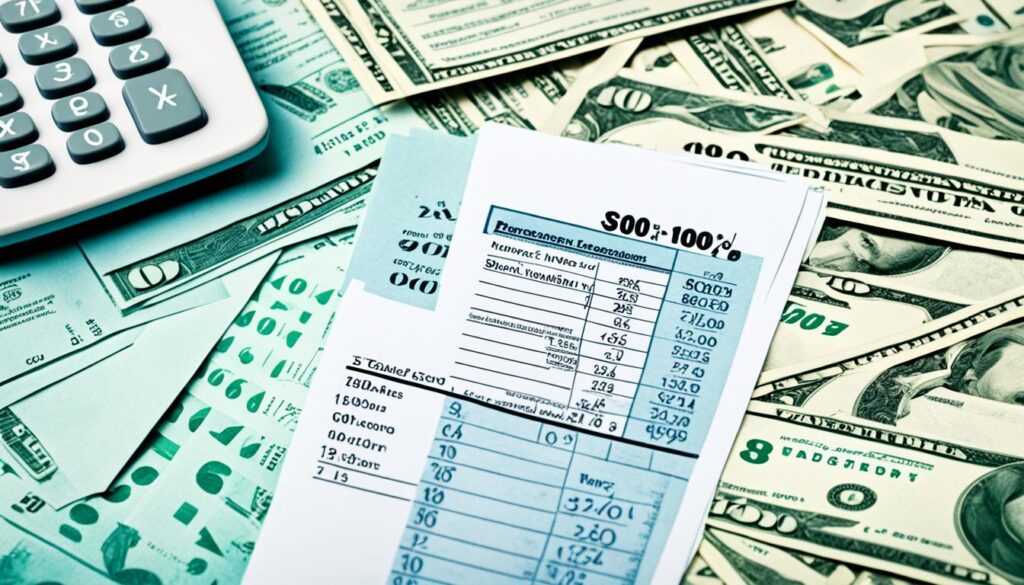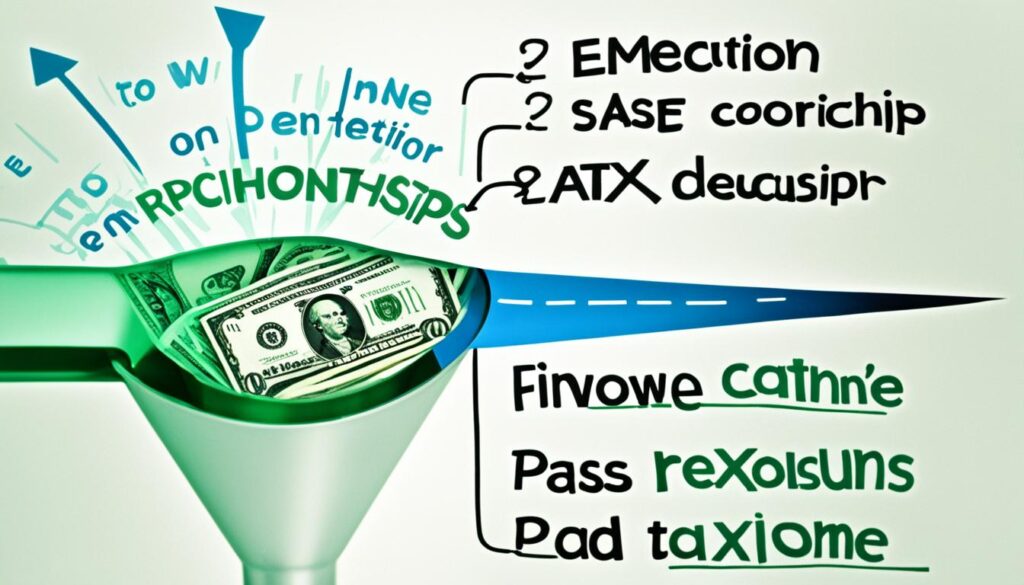Are you running your own business? Unsure about how to handle your taxes? Many small business owners feel lost when it comes to taxes. They’re not sure what they should do.
We’ve created this detailed guide to help. You’ll learn about filing needs, deductions, and tax rates for sole proprietors. It’s perfect for those new to business or anyone looking to better manage their taxes. With this information, you’ll be ready to tackle sole proprietorship taxes.

Key Takeaways:
- Understanding sole proprietorship taxes is crucial for small business owners.
- Sole proprietors report business income on their personal tax returns through pass-through taxation.
- Deductible expenses can help reduce taxable income, including operating expenses, advertising costs, and business-related meals.
- Sole proprietors may qualify for the pass-through tax deduction, allowing them to deduct up to 20% of net business income.
- Estimated taxes must be paid quarterly, and self-employment taxes are equivalent to the payroll tax for employees.
Filing a Tax Return
Sole proprietors are key to their business’s success. When tax season comes, it’s vital to know how to file a tax return. By understanding what’s needed, they can follow the rules and make the most of their taxes.
Sole proprietors add their business income to their personal tax returns. They use a Schedule C with Form 1040 to do this. On the Schedule C, they write down their profit or loss, which shows how much they made after expenses.
Keeping accurate records is very important for sole proprietors. It’s critical to keep personal and business expenses separate. They should use different checkbooks for each. This makes it easier to spot deductible expenses.
“Accurate record-keeping is the backbone of a successful tax filing for sole proprietors. It ensures proper expense classifications and allows for smooth audits if necessary.” – John Smith, CPA
All profits from the business are taxed, no matter how they’re used. This is true even if owners put money back into the business or leave it there. They still need to pay taxes on it.
Here’s an example of how Emily, a freelance graphic designer, might fill out her tax forms:
| Income and Expenses | Amount |
|---|---|
| Total Income | $50,000 |
| Business Expenses | $15,000 |
| Net Profit (Income – Expenses) | $35,000 |
By keeping good records and reporting accurately, sole proprietors can meet tax requirements. They might even lower their taxes with business expense deductions.
The Schedule C and Form 1040
The Schedule C is essential for sole proprietors. It’s used to report income, deductions, and profit or loss. This info goes to Form 1040 to figure out their personal income tax. Knowing these forms well is key for correct tax reporting.
Filing taxes can seem hard, but with the right knowledge, sole proprietors can do it well. By being organized and accurate with their income and expenses, and getting help when needed, they can handle their taxes and improve their finances.
Deductible Business Expenses
As a sole proprietor, you can reduce your taxes by deducting business expenses. You can deduct costs like advertising, travel, and some meals. Always keep detailed records and receipts for these expenses.
Operating expenses include rent, utilities, and office supplies. These are needed for your business and are usually deductible.
“Operating expenses are the backbone of any business, and deducting them can significantly impact your bottom line. Make sure to keep track of all your expenses and consult with a tax professional to ensure you’re maximizing your deductions.”
Advertising costs help attract customers and are deductible. This includes online ads and printed materials.
For travel expenses, you can deduct costs like airfare and car rentals if the travel is for business. You can also deduct hotel stays and half the cost of meals during business trips.
When deducting business meals, you can usually deduct 50% of the cost. This applies to meals during business meetings with clients or employees.
Table: Deductible Business Expenses
| Expense Category | Examples |
|---|---|
| Operating Expenses | Rent, utilities, office supplies |
| Advertising Costs | Marketing campaigns, online ads |
| Travel Expenses | Airfare, rental cars, lodging |
| Business-Related Meals | Meals with clients, potential customers |
To get the most out of your deductions, keep good records. A tax professional can help ensure you follow IRS rules. By doing this, you can lower your tax bill and keep more money.

Pass-Through Tax Deduction for Business Owners
Sole proprietors can benefit from the pass-through tax deduction. This was started with the Tax Cuts and Jobs Act. They can deduct up to 20% of their net business income. This reduces how much tax they have to pay. But there are rules and income limits to know about.
If you want this tax deduction, you must meet certain criteria. If you make more than the set limit, you need employees or assets that lose value. So, those with higher incomes might need to grow their business. This helps them use the deduction fully.
Some personal service providers might not get this tax break if they earn too much. Yet, most sole proprietors find it lowers their taxes a lot. It gives them more money to put back into their businesses.
“The pass-through tax deduction is a valuable tool for sole proprietors to lower their tax liability and increase their net income. By taking advantage of this deduction, business owners can retain more of their hard-earned profits and reinvest them into their businesses.”
Knowing how the pass-through tax deduction works for you is important. It greatly affects your tax planning and financial choices. Talking to a tax specialist or attorney is a good idea. They ensure you understand the rules and limits.

Maximizing the Pass-Through Tax Deduction
To get the most from the pass-through tax deduction, sole proprietors should:
- Keep accurate records: Having clear and organized financial records is key. This helps accurately work out your net business income.
- Optimize expenses: Look over your business costs. Find any deductions you could use to lower your net income.
- Plan for growth: If your income is too high, think about growing your business. This could mean hiring or buying new equipment.
- Stay informed: Keep up with changes to tax rules that affect your deduction. A tax professional can help you make the best choices.
Using the pass-through tax deduction wisely can improve your tax situation and profits. Always speak to a pro who can help you understand your taxes. This ensures you make the best choices for your business.
Estimated Taxes
As a sole proprietor, knowing your tax duties is vital. You need to meet them to avoid late fees. Without an employer to handle taxes for you, you must do it yourself.
These are payments you make four times a year. They are for the IRS and state tax agency, if needed. By doing this, you avoid surprises at year’s end.
To figure out your taxes, guess your yearly income and spending. This guess helps you know how much tax to pay every few months. Look at last year’s taxes to help estimate.
You need to pay most of your tax due during the year. The exact amount is 90% of this year’s taxes or 100% of last year’s, whichever is less. Payments are due in April, June, September, and the next January.
If you miss these payments, or pay less than you should, you’ll face extra charges. Keeping track of money coming in and going out helps avoid this.
Pro Tip: Save a bit of your income each month for taxes, in a separate account. This makes it easier to pay on time and keeps your cash flow smooth.
Handling your taxes can be tough but is key to running your business. With accurate payments, tax season becomes less stressful. It keeps your finances in good shape too.
| Quarter | Payment Due Date |
|---|---|
| Q1 | April 15th |
| Q2 | June 15th |
| Q3 | September 15th |
| Q4 | January 15th |
Pay your estimated taxes on time to avoid penalties. For help, ask a tax professional. They can guide you in planning your finances as a sole proprietor.

Self-Employment Taxes
If you’re a sole proprietor, you pay into Social Security and Medicare. These are your self-employment taxes. Besides your income tax, you also contribute to these social welfare programs.
The self-employment tax rate is 15.3%. This covers both Social Security at 12.4% and Medicare at 2.9%. As a self-employed person, you cover both the employer and employee parts, totaling 15.3%.
Regular employees have half their Social Security and Medicare taxes paid by employers. The rest comes out of their wages. But as a sole proprietor, you must pay it all. Yet, you can deduct half of this self-employment tax, which lessens your tax load.
You must report self-employment taxes on Schedule SE. This form goes with your 1040 tax return and Schedule C.
“Being a sole proprietor means knowing your tax duties for Social Security and Medicare. The total tax can seem big, but claiming a deduction for half makes it easier to handle.”

Incorporating Your Business May Cut Your Tax Bill
Incorporating your business can help save on taxes. A C corporation is seen as its own legal being for taxes. This means C corporation owners pay taxes only on what they get as pay or dividends.
Being a C corporation has its perks, like a set 21% tax rate. This came with the Tax Cuts and Jobs Act. It’s lower than previous rates, cutting down on tax costs.
But C corporations don’t get the pass-through deduction like other business types. Even so, the 21% rate can lead to big savings. This is true for companies that keep their profits.
Companies keeping profits enjoy the lower 21% rate. It’s much less than personal tax rates. This is great for those planning to grow or reinvest their earnings.
Still, turning into a C corporation means more rules and work. It’s smart to talk to a tax pro or lawyer. They can help you understand everything and stay within the law.
By making your business a C corporation, you might lower taxes. This can help your company grow and succeed in the long run.
Consulting a Small Business or Tax Attorney
As a sole proprietor, dealing with tax laws can be tough. Consulting a small business or tax attorney can help. They have the know-how to give you the tax advice you need.
A small business attorney can help you find all the deductions you can take. They can cover everything from operating costs to business meals. They make sure you don’t pay more tax than you should.
“Consulting a small business attorney is crucial, especially when it comes to complex deductions,” says Jane Adams, a tax specialist at Adams & Associates.
An attorney can also help you figure out the best tax setup for your business. They’ll look at your specific situation. Then they’ll suggest the best tax structure for you.
Having an attorney by your side is great for dealing with quarterly taxes and filing returns. They’ll make sure you meet all rules and avoid fines. They make the tax filing process easier.

Getting professional tax help is a smart move. It saves you time and money. A small business or tax attorney knows all about taxes, deductions, and tax laws.
To stay on top of tax laws and make good decisions, talk to a small business or tax attorney. They can guide you on deductions, tax structure, or any tax issue. Their advice will help your business succeed.
Sole Proprietorship Taxes: Beginner’s Guide
Welcome to the beginner’s guide to sole proprietorship taxes. Understanding the tax process is key for your success. Let’s dive into important info you should know.
As a sole proprietor, you report business income on your personal tax return. This involves filing a Schedule C with your Form 1040. It’s important to keep detailed records of all business income and expenses.
You can lower your taxable income with various deductions. These include business expenses like operating costs and advertising, as well as mileage and self-employment tax deductions. Keep a good record of your expenses and deductions to save on taxes.
Here’s how to file your taxes. First, collect all your financial statements. This includes income and expense records. Then, fill out the necessary forms, like Schedule C and Form 1040. Make sure to submit your tax return by the deadline.
Filing taxes as a sole proprietor is manageable. Keeping accurate financial records and getting professional help can make it easier. This guide helps prepare you for your tax duties as a business owner.